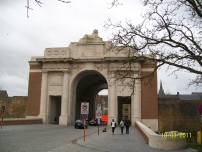| First Name: | Henry | Last Name: | SHUTE | |
|---|---|---|---|---|
| Date of Death: | 31/10/1914 | Lived/Born In: | Willesden | |
| Rank: | Private | Unit: | Royal West Surrey (Queens)1 | |
| Memorial Site: | 1. Willesden, St Andrew 2. Menin Gate, Ypres | |||
Current Information:Born-Somerset Enlisted-London
First Battle of Ypres Between 21st October and 22nd November, 1914 a desperate fight took place around the Belgium city of Ypres, the first of three major battles that were to be fought there during the course of the war. British troops entered Ypres in October. The 1st and 2nd Divisions plus the 3rd Cavalry Division had made their way up from the Aisne as part of the “Race to the Sea”, whilst the 7th Division came west to Ypres after Antwerp had fallen. The Germans knew that Ypres was the gateway to the Channel ports and that these were vital to Britain’s war effort so they poured reinforcements into the area. The fighting fell into three distinct battles; the Battle of Langemarck, 21-24 October, the Battle of Gheluvelt, 29-31 October and the Battle of Nonne Bosschen, 11 November. Ypres did not fall to the Germans but its defence during these two months resulted in the destruction of much of the old regular British Army. The Germans attacked Gheluvelt on 31st October, 1914 at 6 am with no preliminary shelling and no fog to conceal them. The attack fell on 1st Division and at first was beaten off everywhere except for a small lodgement in an orchard where a platoon of 2nd King’s Royal Rifle Corps, 2 Brigade were supporting the 1st Royal West Surrey (Queens) battalion of 3 Brigade. From their foothold here the enemy were able to enfilade the front line of 1st Queens and then begin a systematic bombardment of 3 Brigade’s trenches whilst bringing up more men. The view 1st Queens had of these proceedings was restricted by trees, hedges and the lie of the land and the Germans were able to extend their line east from the orchard in front of them . To their left, 2nd Welsh retired to their support line but no word of this reached 1st Queens and their position south of the road made it impossible to see. Their flank was now unprotected and at 10 am the enemy launched a converging attack against Gheluvelt from both south and north of the Menin road. Thirteen German battalions, six of them fresh, attacked 2nd King’s Royal Rifle Corps, 1st Queens, 2nd Welsh, 1st South Wales Borderers and 1st Scots Guards, barely 1000 men in all. The Germans charged cheering and singing, believing the Kaiser to be present, but British rapid fire held them up for an hour. However, in the end, weight of numbers told especially when two German batteries moved up close and began firing. 1st Queens fell back to their main trenches but soon they were being fired upon from the rear. It was now impossible for them to fall back on the Brigade reserve because that had been driven off and Gheluvelt, either on fire or reduced to rubble, was in German hands. The survivors of 1st Queens withdrew to where the reserve had been but were surrounded and killed with only fourteen managing to escape and re-join 3 Brigade. Henry Shute was one of the battalion’s many casualties on this day. |
||||
| « Back to Search Results | ||||
| If you think any of the information shown here is incorrect, Click Here to submit your amends and comments | ||||




